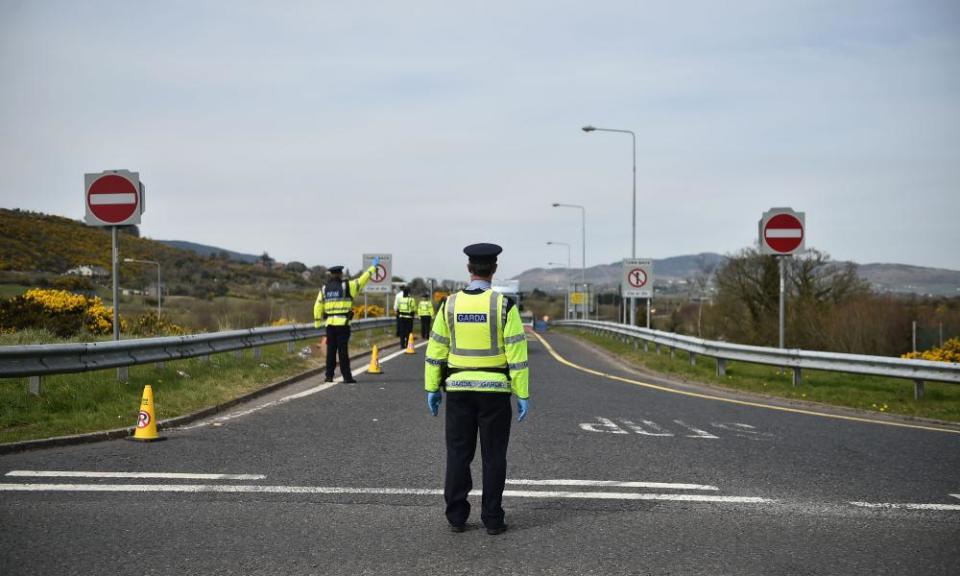Ireland: life under one of the harshest lockdowns in the world
‘Are you over from England?” Just five words. A simple enough question. Yet delivered by a supermarket manager in a small town in County Kerry last year, shortly after Ireland had been forced into the first of its many lockdowns, the innocent question seemed to take on a new dimension.
People had been ordered to stay within 2km of their homes, but there were rumours that rogue elements, in these early disbelieving days of the pandemic, had ignored the restrictions and were continuing to travel. There was talk of holiday homes being occupied, of visitors arriving from elsewhere in Ireland – and across the sea from Britain.
Few cases of Covid-19 had been reported in the county, yet there was a growing fear of infection, of rule-breaking outsiders carrying the virus with them from Dublin and London. We had arrived from Cork, another perceived hotspot, a few weeks earlier, before the emergency measures took hold, but there were whispers of subsequent newcomers being reported to the local gardai. The mood was edgy, even a little paranoid.
Hence the casual convenience-store query, with its hint of disapproval, its touch of accusation.
“No, I’m not. I live here.”
I meant Ireland. The manager’s expression told me he was looking for something more specific. If I lived locally, why did he not recognise me, why had he not seen me in the store before?
My partner Jacqueline and I returned to Cork from our house in Kerry later in 2020, and in effect we had two lockdown experiences – one rural, one urban. Much of the time we spent in Kerry was weirdly, guiltily positive. I was working on a book, which I completed. I had no excuses. At all. The lockdown was like some dark cosmic gift: here’s a chunk of time with no distractions whatsoever and no remote fear of missing out on anything.
These were rambles that reminded me travel is often more about the particular than the panoramic; it’s about paying attention
There were sunny summer afternoon cycle rides on a Ring of Kerry free of bulldozing coaches and zigzagging hire cars. There was the stillness and solitude of strolls along empty beaches, even if they did sometimes feel post-apocalyptic – or like starring in your own episode of The Prisoner.
Back in the city, there were (distanced) evening walks with friends and the revelation of seeing the familiar anew, of discovering alleyways, cul-de-sacs, houses, gardens, parklands, cemeteries, plaques and statues that I’d blindly whizzed past in a car. We became tourists in our own city, our own local history guides. They were rambles that reminded me that travel is often more about the particular than the panoramic; it’s about paying attention.
The major minus – apart from the sadness and worry and Weltschmerz, of course – was the lack of freedom of movement. While the travel limit was lifted in June, a 5km rule was reimposed at the end of December – and lasted for the next 103 days. The confinement was again strictly enforced: there were nationwide checkpoints and on-the-spot fines for non-essential travel. Most people I spoke to in Britain seemed unaware of just how stringent and repressive the restrictions were here in the Republic, that according to an Oxford University analysis Ireland was “living under one of the harshest coronavirus lockdowns in the world”.

There were roadblocks on all the major routes out of the city, and we began to feel hemmed in. Not only was this the longest I had ever been without getting on a plane and going somewhere, especially back to family and friends in England, but it was hard to even venture beyond the city limits. It felt psychologically imprisoning – the Divine Republic not of Cork but of Gilead.
Which is why from yesterday, as the lockdown in Ireland further eases and hotels and guesthouses reopen, with restaurants and gastropubs starting to serve people outdoors five days later, the sense of liberation seems that much greater.
You can’t get a room in a good hotel, especially one by the sea or with a spa, or both, for love nor money, of course. But you can dream. Again. Of spending money on something more luxurious than organic chard. Of going somewhere new, and different. Of sleeping in a bed that you haven’t yourself made. Of putting on your glad rags and wandering down to a dinner cooked by real chefs in real time. Of a pint of Guinness at the bar. Of a late breakfast, the full Irish.
And dream that the enquiry “are you over from England?” will once again mean what I’ve almost always found it to mean – over the 17 hugely enjoyable years that I’ve lived in Ireland, and even allowing for my naive idealism, both personal and historical – welcome.
• Philip Watson’s biography of the guitarist Bill Frisell, Beautiful Dreamer, will be published by Faber next March


